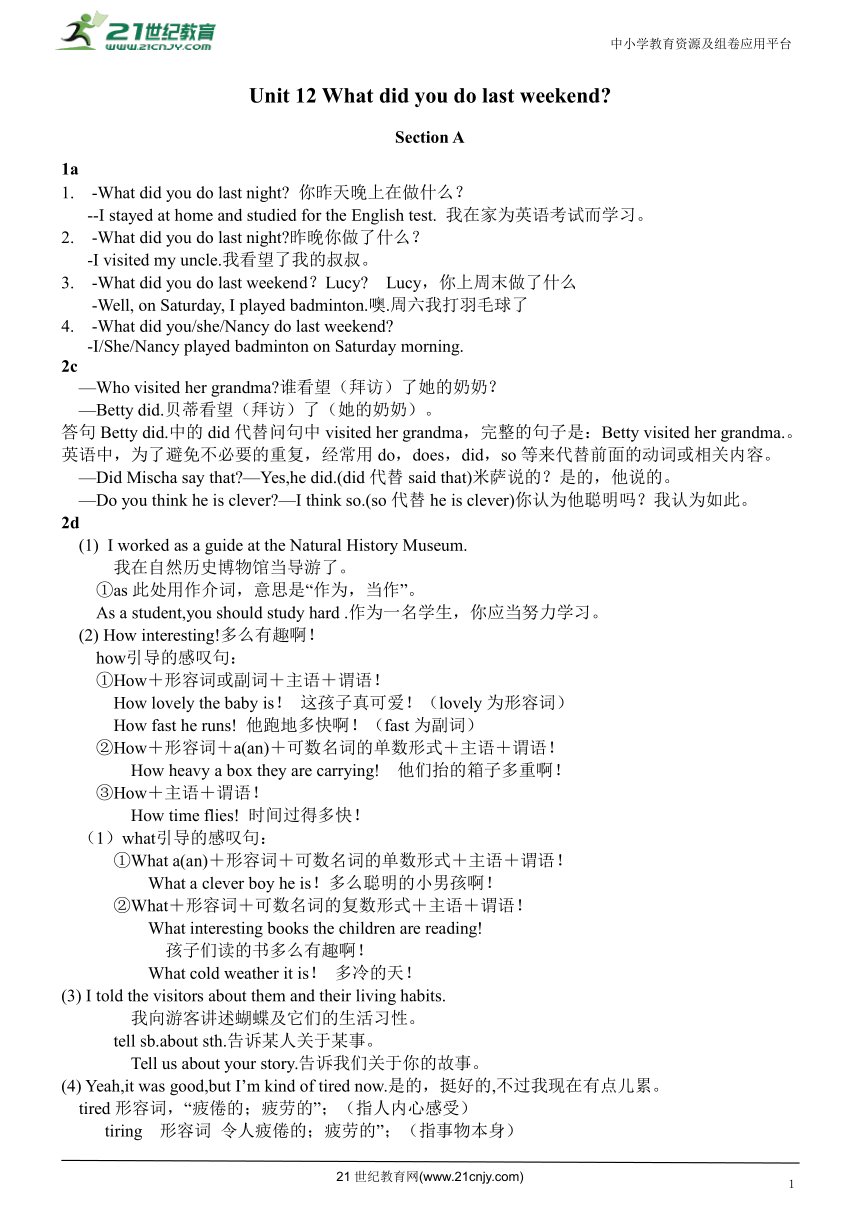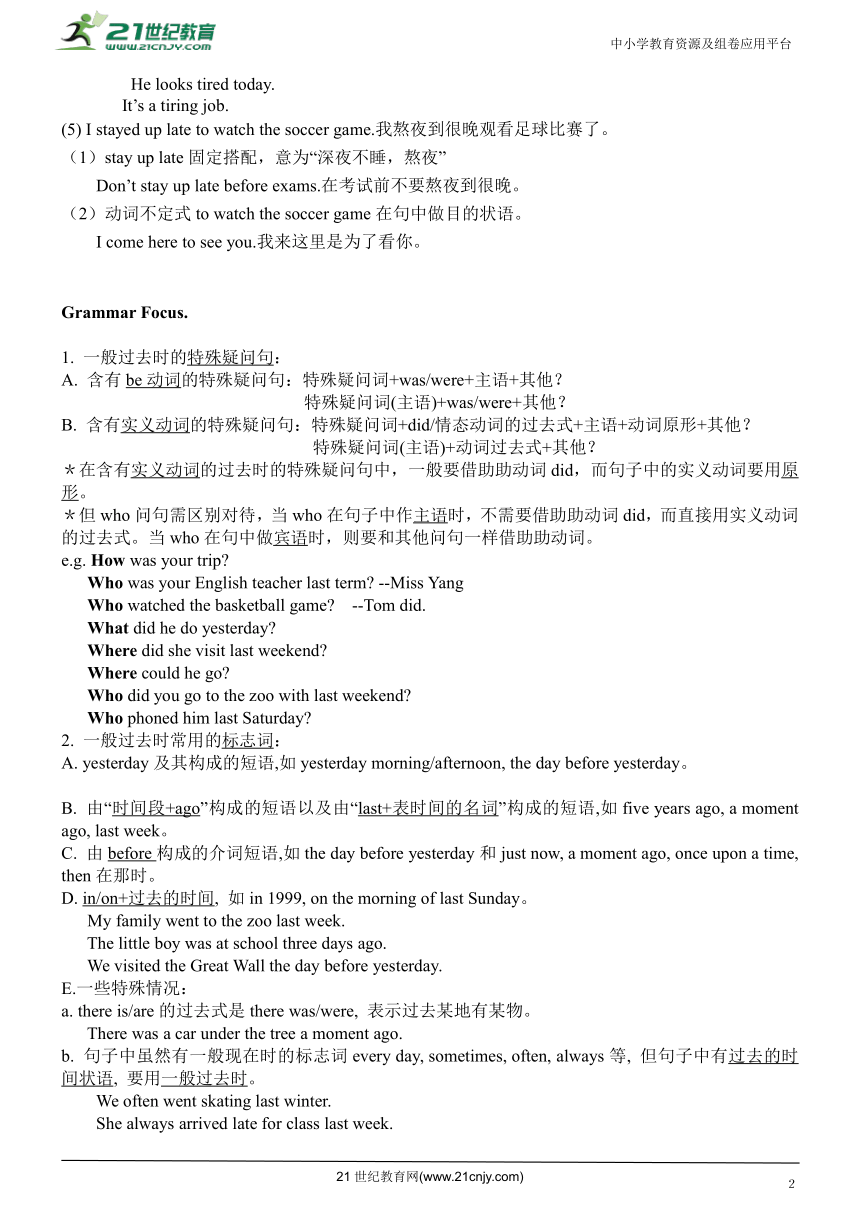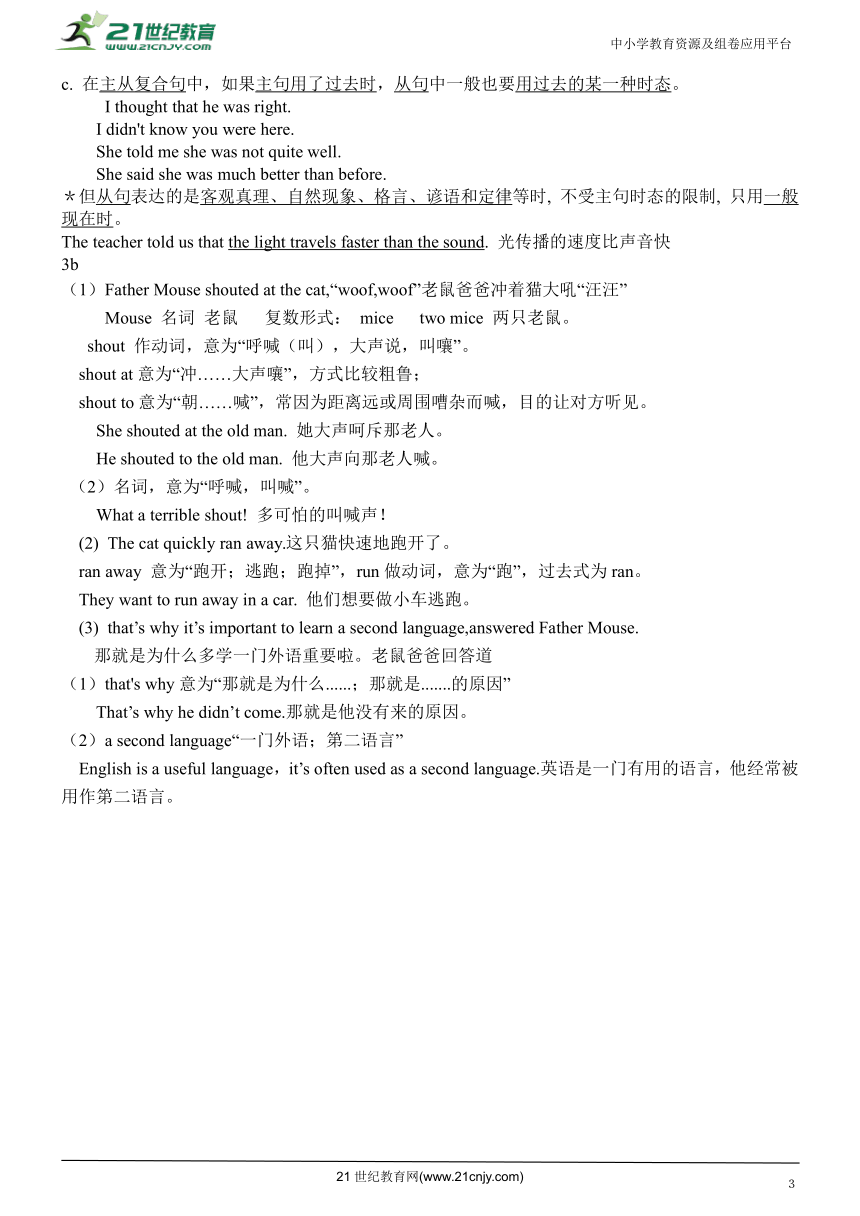Unit 12 What did you do last weekend知识点总结归纳【人教版七年级下册英语】
文档属性
| 名称 | Unit 12 What did you do last weekend知识点总结归纳【人教版七年级下册英语】 |

|
|
| 格式 | docx | ||
| 文件大小 | 58.6KB | ||
| 资源类型 | 试卷 | ||
| 版本资源 | 人教新目标(Go for it)版 | ||
| 科目 | 英语 | ||
| 更新时间 | 2024-04-10 14:30:35 | ||
图片预览



文档简介
中小学教育资源及组卷应用平台
Unit 12 What did you do last weekend
Section A
1a
-What did you do last night 你昨天晚上在做什么?
--I stayed at home and studied for the English test. 我在家为英语考试而学习。
-What did you do last night 昨晚你做了什么?
-I visited my uncle.我看望了我的叔叔。
-What did you do last weekend?Lucy Lucy,你上周末做了什么
-Well, on Saturday, I played badminton.噢.周六我打羽毛球了
-What did you/she/Nancy do last weekend
-I/She/Nancy played badminton on Saturday morning.
2c
—Who visited her grandma 谁看望(拜访)了她的奶奶?
—Betty did.贝蒂看望(拜访)了(她的奶奶)。
答句Betty did.中的did代替问句中visited her grandma,完整的句子是:Betty visited her grandma.。英语中,为了避免不必要的重复,经常用do,does,did,so等来代替前面的动词或相关内容。
—Did Mischa say that —Yes,he did.(did代替said that)米萨说的?是的,他说的。
—Do you think he is clever —I think so.(so代替he is clever)你认为他聪明吗?我认为如此。
2d
I worked as a guide at the Natural History Museum.
我在自然历史博物馆当导游了。
①as此处用作介词,意思是“作为,当作”。
As a student,you should study hard .作为一名学生,你应当努力学习。
(2) How interesting!多么有趣啊!
how引导的感叹句:
①How+形容词或副词+主语+谓语!
How lovely the baby is! 这孩子真可爱!(lovely为形容词)
How fast he runs! 他跑地多快啊!(fast为副词)
②How+形容词+a(an)+可数名词的单数形式+主语+谓语!
How heavy a box they are carrying! 他们抬的箱子多重啊!
③How+主语+谓语!
How time flies! 时间过得多快!
(1)what引导的感叹句:
①What a(an)+形容词+可数名词的单数形式+主语+谓语!
What a clever boy he is!多么聪明的小男孩啊!
②What+形容词+可数名词的复数形式+主语+谓语!
What interesting books the children are reading!
孩子们读的书多么有趣啊!
What cold weather it is! 多冷的天!
(3) I told the visitors about them and their living habits.
我向游客讲述蝴蝶及它们的生活习性。
tell sb.about sth.告诉某人关于某事。
Tell us about your story.告诉我们关于你的故事。
(4) Yeah,it was good,but I’m kind of tired now.是的,挺好的,不过我现在有点儿累。
tired形容词,“疲倦的;疲劳的”;(指人内心感受)
tiring 形容词 令人疲倦的;疲劳的”;(指事物本身)
He looks tired today.
It’s a tiring job.
(5) I stayed up late to watch the soccer game.我熬夜到很晚观看足球比赛了。
stay up late固定搭配,意为“深夜不睡,熬夜”
Don’t stay up late before exams.在考试前不要熬夜到很晚。
动词不定式to watch the soccer game在句中做目的状语。
I come here to see you.我来这里是为了看你。
Grammar Focus.
1. 一般过去时的特殊疑问句:
A. 含有be动词的特殊疑问句:特殊疑问词+was/were+主语+其他?
特殊疑问词(主语)+was/were+其他?
B. 含有实义动词的特殊疑问句:特殊疑问词+did/情态动词的过去式+主语+动词原形+其他?
特殊疑问词(主语)+动词过去式+其他?
*在含有实义动词的过去时的特殊疑问句中,一般要借助助动词did,而句子中的实义动词要用原形。
*但who问句需区别对待,当who在句子中作主语时,不需要借助助动词did,而直接用实义动词的过去式。当who在句中做宾语时,则要和其他问句一样借助助动词。
e.g. How was your trip
Who was your English teacher last term --Miss Yang
Who watched the basketball game --Tom did.
What did he do yesterday
Where did she visit last weekend
Where could he go
Who did you go to the zoo with last weekend
Who phoned him last Saturday
2. 一般过去时常用的标志词:
A. yesterday及其构成的短语,如yesterday morning/afternoon, the day before yesterday。
B. 由“时间段+ago”构成的短语以及由“last+表时间的名词”构成的短语,如five years ago, a moment ago, last week。
C. 由before构成的介词短语,如the day before yesterday和just now, a moment ago, once upon a time, then在那时。
D. in/on+过去的时间, 如in 1999, on the morning of last Sunday。
My family went to the zoo last week.
The little boy was at school three days ago.
We visited the Great Wall the day before yesterday.
E.一些特殊情况:
a. there is/are的过去式是there was/were, 表示过去某地有某物。
There was a car under the tree a moment ago.
b. 句子中虽然有一般现在时的标志词every day, sometimes, often, always等, 但句子中有过去的时间状语, 要用一般过去时。
We often went skating last winter.
She always arrived late for class last week.
c. 在主从复合句中,如果主句用了过去时,从句中一般也要用过去的某一种时态。
I thought that he was right.
I didn't know you were here.
She told me she was not quite well.
She said she was much better than before.
*但从句表达的是客观真理、自然现象、格言、谚语和定律等时, 不受主句时态的限制, 只用一般现在时。
The teacher told us that the light travels faster than the sound. 光传播的速度比声音快
3b
Father Mouse shouted at the cat,“woof,woof”老鼠爸爸冲着猫大吼“汪汪”
Mouse 名词 老鼠 复数形式: mice two mice 两只老鼠。
shout 作动词,意为“呼喊(叫),大声说,叫嚷”。
shout at意为“冲……大声嚷”,方式比较粗鲁;
shout to意为“朝……喊”,常因为距离远或周围嘈杂而喊,目的让对方听见。
She shouted at the old man. 她大声呵斥那老人。
He shouted to the old man. 他大声向那老人喊。
(2)名词,意为“呼喊,叫喊”。
What a terrible shout! 多可怕的叫喊声!
The cat quickly ran away.这只猫快速地跑开了。
ran away 意为“跑开;逃跑;跑掉”,run做动词,意为“跑”,过去式为ran。
They want to run away in a car. 他们想要做小车逃跑。
that’s why it’s important to learn a second language,answered Father Mouse.
那就是为什么多学一门外语重要啦。老鼠爸爸回答道
that's why意为“那就是为什么......;那就是.......的原因”
That’s why he didn’t come.那就是他没有来的原因。
a second language“一门外语;第二语言”
English is a useful language,it’s often used as a second language.英语是一门有用的语言,他经常被用作第二语言。
Section B
1e
Did you do anything interesting last weekend
上周末你做什么有趣的事情了吗?
Anything interesting意为“有趣的事情”。形容词修饰anything,something等不定代词时要放在被修饰词的后面。
I have something important to tell you.我有重要的事情要告诉你。
2b
My sister finished high school two years ago.我姐姐(妹妹)两周前中学毕业了。
ago 表示从现在起的若干时间以前,常与过去时连用。
before 表示从过去起的若干时间以前,常与完成时或过去时连用。
e.g. I went to see her three days ago,but she had gone to Japan two weeks before.
我三天前去看她,但她早在两周前就去日本啦。
There we put up our tents and made a fire to keep us warm and cook food on.在那里我们架起帐篷,生火取暖并做饭。
(1)put up意为“搭建,搭起”
It’s going to rain. Let's put up the tent. 天要下雨了,我们把帐篷搭起来
(2)make a fire“生火;点起篝火”,句中made是make的过去式。
He went back home and make a fire.他回到家里,生起了火。
keep us warm意为“使我们暖和”。
Keep+宾语+宾语补足语,意为“使....保持某种状态”,
We should keep our classroom clean and tidy.
我们应该保持教室干净整洁。
You’d better keep the child away from the fire.你最好让孩子离火远一点儿。
But I was so tired that I went to sleep early.“我是如此的累,以至于我很早就睡了。”;
so… that…的意思是“如此……以至于……”,它引导结果状语从句。
The boy ran so fast that I couldn’t catch up with him.
男孩跑得如此快,以至于我追不上他。
She is so beautiful that many people like her.
她太漂亮了以至于很多人喜欢她。
The next morning,my sister and I got a terrible surprise.
第二天早上,我和姐姐大吃一惊。
①辨析:the next morning与next morning
the next morning “第二天早上”,是以过去或将来某一时间为起点的第二天早上 We started the next morning. 第二天早上,我们出发了。
next morning “明天早上”,是以现在为起点的第二天早上 We will visit him next morning.我们明天早上会去看望他。
②get a surprise吃惊,in surprise惊奇地,惊讶地,
to one’s surprise让(使)某人吃惊的是。
The students looked at the teacher in surprise.学生们惊奇地看着老师。
She jumped up in surprise.她惊讶地跳了起来。
To my surprise,he didn’t pass the exam.使我吃惊的是,他考试没及格。
surprised与surprising
surprised 形容词 对…感到惊讶,形容人 She was surprised at the surprising news.她对这则惊人的新闻感到惊讶。
surprising 形容词 令人惊奇的,形容事物
When we looked out of our tent,we saw a big snake sleeping near the fire.
我们向帐篷外面去看时,看见一条大蛇正在篝火附近睡觉。
①look out of意为“朝/向……外看”,反义词是into,
Please don’t look out of the window in class.上课期间请不要向窗外看。
【拓展】look out意为“当心;小心”。
②see sb/sth.doing sth.意为“看见某人/某物正在做某事”,表示看到动作正在发生,强调动作的进行性;
I saw him working in the garden yesterday.昨天我见他正在花园里干活。(强调“我见他正干活”这个动作)
see sb. do sth.意为“看见某人做某事了”,表示看见某人做某事的全过程,强调动作的真实性。
I saw him work in the garden yesterday.昨天我看见他在花园里干活了。(强调“我看见了”这个事实)
6. I was so scared that I couldn’t move.我是那么害怕,一动都不敢动。
①scared为形容词,意为“惊慌的;吓坏了的”,
be scared of sth害怕某物,be scared to do sth.害怕做某事。
He was scared of snakes.他害怕蛇。
I was too scared to move.我吓得动弹不得。
【辨析】scared,scare与scary
scared 形容词 惊慌的, I felt scared because of the big dog.
scare 动词 使恐惧 The terrible movie scared me.
scary 形容词 吓人的 The movie is really scary.
7 .My dad started to jump up and down in their tent
.我爸爸开始在他们的帐篷内上下跳跃。
①start to do/doing sth.“开始做某事”。
E.g: The child started to cry/crying.那个小孩开始哭了。
②jump的常见短语:jump up 跳起来 jump into跳入,
③up and down意为“上上下下;到处;上下地”,
This woke the snake up and it moved into the forest near the lake.这把蛇惊醒了,
他爬进了湖边的森林里。
wake sb. up 意为“把某人叫醒”,
The students usually wake up early. 学生们通常醒的很早。
Don’t wake your father up. He’s too tired. 不要把你父亲吵醒。他太累了。
作文
Last weekend was fun. On Saturday morning, I went shopping at the supermarket with my mother and then we had lunch at home. After lunch, I helped my father with some housework. Later in the afternoon, I played volleyball with my friends at the park. On Sunday morning, I wrote a letter in English to my pen pal. Then I had lunch with my friends at a restaurant near our home. In the evening, I watched a movie with my parents.
21世纪教育网(www.21cnjy.com)
Unit 12 What did you do last weekend
Section A
1a
-What did you do last night 你昨天晚上在做什么?
--I stayed at home and studied for the English test. 我在家为英语考试而学习。
-What did you do last night 昨晚你做了什么?
-I visited my uncle.我看望了我的叔叔。
-What did you do last weekend?Lucy Lucy,你上周末做了什么
-Well, on Saturday, I played badminton.噢.周六我打羽毛球了
-What did you/she/Nancy do last weekend
-I/She/Nancy played badminton on Saturday morning.
2c
—Who visited her grandma 谁看望(拜访)了她的奶奶?
—Betty did.贝蒂看望(拜访)了(她的奶奶)。
答句Betty did.中的did代替问句中visited her grandma,完整的句子是:Betty visited her grandma.。英语中,为了避免不必要的重复,经常用do,does,did,so等来代替前面的动词或相关内容。
—Did Mischa say that —Yes,he did.(did代替said that)米萨说的?是的,他说的。
—Do you think he is clever —I think so.(so代替he is clever)你认为他聪明吗?我认为如此。
2d
I worked as a guide at the Natural History Museum.
我在自然历史博物馆当导游了。
①as此处用作介词,意思是“作为,当作”。
As a student,you should study hard .作为一名学生,你应当努力学习。
(2) How interesting!多么有趣啊!
how引导的感叹句:
①How+形容词或副词+主语+谓语!
How lovely the baby is! 这孩子真可爱!(lovely为形容词)
How fast he runs! 他跑地多快啊!(fast为副词)
②How+形容词+a(an)+可数名词的单数形式+主语+谓语!
How heavy a box they are carrying! 他们抬的箱子多重啊!
③How+主语+谓语!
How time flies! 时间过得多快!
(1)what引导的感叹句:
①What a(an)+形容词+可数名词的单数形式+主语+谓语!
What a clever boy he is!多么聪明的小男孩啊!
②What+形容词+可数名词的复数形式+主语+谓语!
What interesting books the children are reading!
孩子们读的书多么有趣啊!
What cold weather it is! 多冷的天!
(3) I told the visitors about them and their living habits.
我向游客讲述蝴蝶及它们的生活习性。
tell sb.about sth.告诉某人关于某事。
Tell us about your story.告诉我们关于你的故事。
(4) Yeah,it was good,but I’m kind of tired now.是的,挺好的,不过我现在有点儿累。
tired形容词,“疲倦的;疲劳的”;(指人内心感受)
tiring 形容词 令人疲倦的;疲劳的”;(指事物本身)
He looks tired today.
It’s a tiring job.
(5) I stayed up late to watch the soccer game.我熬夜到很晚观看足球比赛了。
stay up late固定搭配,意为“深夜不睡,熬夜”
Don’t stay up late before exams.在考试前不要熬夜到很晚。
动词不定式to watch the soccer game在句中做目的状语。
I come here to see you.我来这里是为了看你。
Grammar Focus.
1. 一般过去时的特殊疑问句:
A. 含有be动词的特殊疑问句:特殊疑问词+was/were+主语+其他?
特殊疑问词(主语)+was/were+其他?
B. 含有实义动词的特殊疑问句:特殊疑问词+did/情态动词的过去式+主语+动词原形+其他?
特殊疑问词(主语)+动词过去式+其他?
*在含有实义动词的过去时的特殊疑问句中,一般要借助助动词did,而句子中的实义动词要用原形。
*但who问句需区别对待,当who在句子中作主语时,不需要借助助动词did,而直接用实义动词的过去式。当who在句中做宾语时,则要和其他问句一样借助助动词。
e.g. How was your trip
Who was your English teacher last term --Miss Yang
Who watched the basketball game --Tom did.
What did he do yesterday
Where did she visit last weekend
Where could he go
Who did you go to the zoo with last weekend
Who phoned him last Saturday
2. 一般过去时常用的标志词:
A. yesterday及其构成的短语,如yesterday morning/afternoon, the day before yesterday。
B. 由“时间段+ago”构成的短语以及由“last+表时间的名词”构成的短语,如five years ago, a moment ago, last week。
C. 由before构成的介词短语,如the day before yesterday和just now, a moment ago, once upon a time, then在那时。
D. in/on+过去的时间, 如in 1999, on the morning of last Sunday。
My family went to the zoo last week.
The little boy was at school three days ago.
We visited the Great Wall the day before yesterday.
E.一些特殊情况:
a. there is/are的过去式是there was/were, 表示过去某地有某物。
There was a car under the tree a moment ago.
b. 句子中虽然有一般现在时的标志词every day, sometimes, often, always等, 但句子中有过去的时间状语, 要用一般过去时。
We often went skating last winter.
She always arrived late for class last week.
c. 在主从复合句中,如果主句用了过去时,从句中一般也要用过去的某一种时态。
I thought that he was right.
I didn't know you were here.
She told me she was not quite well.
She said she was much better than before.
*但从句表达的是客观真理、自然现象、格言、谚语和定律等时, 不受主句时态的限制, 只用一般现在时。
The teacher told us that the light travels faster than the sound. 光传播的速度比声音快
3b
Father Mouse shouted at the cat,“woof,woof”老鼠爸爸冲着猫大吼“汪汪”
Mouse 名词 老鼠 复数形式: mice two mice 两只老鼠。
shout 作动词,意为“呼喊(叫),大声说,叫嚷”。
shout at意为“冲……大声嚷”,方式比较粗鲁;
shout to意为“朝……喊”,常因为距离远或周围嘈杂而喊,目的让对方听见。
She shouted at the old man. 她大声呵斥那老人。
He shouted to the old man. 他大声向那老人喊。
(2)名词,意为“呼喊,叫喊”。
What a terrible shout! 多可怕的叫喊声!
The cat quickly ran away.这只猫快速地跑开了。
ran away 意为“跑开;逃跑;跑掉”,run做动词,意为“跑”,过去式为ran。
They want to run away in a car. 他们想要做小车逃跑。
that’s why it’s important to learn a second language,answered Father Mouse.
那就是为什么多学一门外语重要啦。老鼠爸爸回答道
that's why意为“那就是为什么......;那就是.......的原因”
That’s why he didn’t come.那就是他没有来的原因。
a second language“一门外语;第二语言”
English is a useful language,it’s often used as a second language.英语是一门有用的语言,他经常被用作第二语言。
Section B
1e
Did you do anything interesting last weekend
上周末你做什么有趣的事情了吗?
Anything interesting意为“有趣的事情”。形容词修饰anything,something等不定代词时要放在被修饰词的后面。
I have something important to tell you.我有重要的事情要告诉你。
2b
My sister finished high school two years ago.我姐姐(妹妹)两周前中学毕业了。
ago 表示从现在起的若干时间以前,常与过去时连用。
before 表示从过去起的若干时间以前,常与完成时或过去时连用。
e.g. I went to see her three days ago,but she had gone to Japan two weeks before.
我三天前去看她,但她早在两周前就去日本啦。
There we put up our tents and made a fire to keep us warm and cook food on.在那里我们架起帐篷,生火取暖并做饭。
(1)put up意为“搭建,搭起”
It’s going to rain. Let's put up the tent. 天要下雨了,我们把帐篷搭起来
(2)make a fire“生火;点起篝火”,句中made是make的过去式。
He went back home and make a fire.他回到家里,生起了火。
keep us warm意为“使我们暖和”。
Keep+宾语+宾语补足语,意为“使....保持某种状态”,
We should keep our classroom clean and tidy.
我们应该保持教室干净整洁。
You’d better keep the child away from the fire.你最好让孩子离火远一点儿。
But I was so tired that I went to sleep early.“我是如此的累,以至于我很早就睡了。”;
so… that…的意思是“如此……以至于……”,它引导结果状语从句。
The boy ran so fast that I couldn’t catch up with him.
男孩跑得如此快,以至于我追不上他。
She is so beautiful that many people like her.
她太漂亮了以至于很多人喜欢她。
The next morning,my sister and I got a terrible surprise.
第二天早上,我和姐姐大吃一惊。
①辨析:the next morning与next morning
the next morning “第二天早上”,是以过去或将来某一时间为起点的第二天早上 We started the next morning. 第二天早上,我们出发了。
next morning “明天早上”,是以现在为起点的第二天早上 We will visit him next morning.我们明天早上会去看望他。
②get a surprise吃惊,in surprise惊奇地,惊讶地,
to one’s surprise让(使)某人吃惊的是。
The students looked at the teacher in surprise.学生们惊奇地看着老师。
She jumped up in surprise.她惊讶地跳了起来。
To my surprise,he didn’t pass the exam.使我吃惊的是,他考试没及格。
surprised与surprising
surprised 形容词 对…感到惊讶,形容人 She was surprised at the surprising news.她对这则惊人的新闻感到惊讶。
surprising 形容词 令人惊奇的,形容事物
When we looked out of our tent,we saw a big snake sleeping near the fire.
我们向帐篷外面去看时,看见一条大蛇正在篝火附近睡觉。
①look out of意为“朝/向……外看”,反义词是into,
Please don’t look out of the window in class.上课期间请不要向窗外看。
【拓展】look out意为“当心;小心”。
②see sb/sth.doing sth.意为“看见某人/某物正在做某事”,表示看到动作正在发生,强调动作的进行性;
I saw him working in the garden yesterday.昨天我见他正在花园里干活。(强调“我见他正干活”这个动作)
see sb. do sth.意为“看见某人做某事了”,表示看见某人做某事的全过程,强调动作的真实性。
I saw him work in the garden yesterday.昨天我看见他在花园里干活了。(强调“我看见了”这个事实)
6. I was so scared that I couldn’t move.我是那么害怕,一动都不敢动。
①scared为形容词,意为“惊慌的;吓坏了的”,
be scared of sth害怕某物,be scared to do sth.害怕做某事。
He was scared of snakes.他害怕蛇。
I was too scared to move.我吓得动弹不得。
【辨析】scared,scare与scary
scared 形容词 惊慌的, I felt scared because of the big dog.
scare 动词 使恐惧 The terrible movie scared me.
scary 形容词 吓人的 The movie is really scary.
7 .My dad started to jump up and down in their tent
.我爸爸开始在他们的帐篷内上下跳跃。
①start to do/doing sth.“开始做某事”。
E.g: The child started to cry/crying.那个小孩开始哭了。
②jump的常见短语:jump up 跳起来 jump into跳入,
③up and down意为“上上下下;到处;上下地”,
This woke the snake up and it moved into the forest near the lake.这把蛇惊醒了,
他爬进了湖边的森林里。
wake sb. up 意为“把某人叫醒”,
The students usually wake up early. 学生们通常醒的很早。
Don’t wake your father up. He’s too tired. 不要把你父亲吵醒。他太累了。
作文
Last weekend was fun. On Saturday morning, I went shopping at the supermarket with my mother and then we had lunch at home. After lunch, I helped my father with some housework. Later in the afternoon, I played volleyball with my friends at the park. On Sunday morning, I wrote a letter in English to my pen pal. Then I had lunch with my friends at a restaurant near our home. In the evening, I watched a movie with my parents.
21世纪教育网(www.21cnjy.com)
同课章节目录
- Unit 1 Can you play the guitar?
- Section A
- Section B
- Unit 2 What time do you go to school?
- Section A
- Section B
- Unit 3 How do you get to school?
- Section A
- Section B
- Unit 4 Don't eat in class.
- Section A
- Section B
- Unit 5 Why do you like pandas?
- Section A
- Section B
- Unit 6 I'm watching TV.
- Section A
- Section B
- Review of Units 1-6
- Unit 7 It's raining!
- Section A
- Section B
- Unit 8 Is there a post office near here?
- Section A
- Section B
- Unit 9 What does he look like?
- Section A
- Section B
- Unit 10 I'd like some noodles.
- Section A
- Section B
- Unit 11 How was your school trip?
- Section A
- Section B
- Unit 12 What did you do last weekend?
- Section A
- Section B
